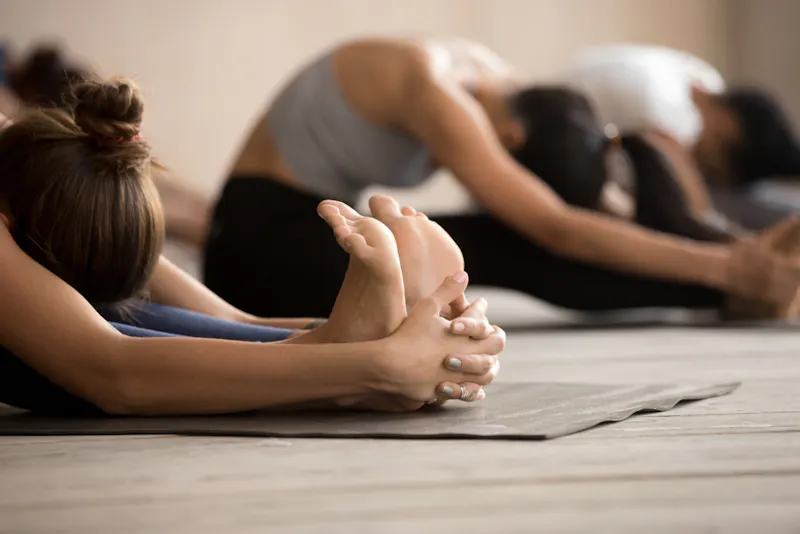General anxiety disorder (GAD)
What's covered?



Anxiety is essential for your survival — it’s a normal physiological response to potential dangers. Anxiety can also be highly motivating when you experience challenges. But in a modern world with many stressors, your fight-or-flight response might be on overdrive and harm your health. Find out more about the causes and symptoms of GAD and how to get help.
What is anxiety?
Anxiety is a feeling of unease, worry, or fear.
It’s normal to feel anxious from time to time. You might feel anxious about many things — like sitting for an exam, a job interview, or going on a date.
But anxiety becomes a serious issue when it persists and affects your daily life. This is called an anxiety disorder.
GAD affects up to 5% of the UK population. It’s a long-term mental health condition that makes you anxious about many different situations rather than one specific event.
You might feel anxious most days or struggle to remember the last time you felt at ease if you live with GAD.
It’s common to have depression or other anxiety disorders if you have GAD. People with neurodivergent conditions like autism and ADHD are more likely to suffer from anxiety.
While GAD is the most common anxiety disorder among adults in the UK, there are others, including:
- panic disorder
- social anxiety
- phobias
- obsessive-compulsive disorder (OCD)
- post-traumatic stress disorder (PTSD)
Research suggests that magnesium supplements might help to reduce anxiety symptoms.
What are the symptoms of anxiety?
Like depression, the symptoms of anxiety can be both mental and physical. Your symptoms might range from mild to severe or change over time.
Common mental (psychological) symptoms include:
- restlessness
- feelings of dread
- feelings of guilt or shame
- difficulty concentrating
- irritability
Your symptoms might make you less social and find work more difficult and stressful. Or, if you have high-functioning anxiety, you might find you can still go about your daily activities.
Common physical symptoms of anxiety include:
- dizziness
- tiredness or fatigue
- trembling or shaking
- dry mouth
- heart palpitations
- shortness of breath
- feeling sick
- pins and needles
- difficulty sleeping
You might have only one or two symptoms or experience many of them simultaneously. Anxiety symptoms differ from person to person and might not be consistent throughout your life.
Anxiety tends to affect more women than men. It’s also more common if you’re between the ages of 35 to 59.
If you’re experiencing any of these symptoms, you should see your GP. They can rule out other conditions that might feature similar symptoms, like an underactive thyroid (hyperthyroidism) or an overactive thyroid (hypothyroidism).
You can help manage anxiety symptoms by taking our premium magnesium supplements. But you should check with your doctor first before starting a new supplement.
What causes anxiety?
The exact cause of anxiety is unknown. But biological, psychological, and social factors might play a significant role.
Biological causes of anxiety might include:
- your genetics — you’re five times more likely to develop GAD if your parents have it
- an imbalance of neurotransmitters — like gamma-aminobutyric acid (GABA), serotonin, and dopamine, which are all responsible for regulating anxiety
- illness
- medication
- poor nutrition
- premenstrual syndrome (PMS) or premenstrual dysphoric disorder (PMDD) — if you have periods, your anxiety levels might increase as your hormone levels fluctuate
Psychological causes of anxiety might include:
- personality traits — like viewing the world negatively (neuroticism)
- low self-esteem — lacking confidence in yourself
- cognitive dissonance — having contradictory ideas, beliefs, or values
- negative emotions
- conflict with yourself or others
- perceiving situations negatively
Social causes of anxiety might include:
- adverse life experiences — like violence, emotional and physical abuse, or substance abuse
- lack of social support
- work stress
- lack of social skills
- terrorism
- climate change
- global health issues — like the COVID-19 pandemic
How to test for anxiety
Anxiety is a very complex mental health condition, so there’s no simple test.
If anxiety is affecting your daily life, you should see your GP. They’ll ask about your symptoms, and you might have to complete the general anxiety disorder assessment (GAD-7).
The self-report questionnaire covers your mental health and quality of life over the last 2 weeks.
Your GP might also run some blood tests to rule out other health conditions.
General anxiety disorder treatment
GAD is a long-term mental health condition, and its symptoms can significantly affect your life. But the good news is that many treatments and self-help tips are available to help manage your symptoms.
You might find some treatments are more helpful than others — coping strategies can differ from person to person.
Combining treatments and self-help might be enough to help control your anxiety levels. But some treatments like medication might be needed in the long term, and there might be times when your symptoms improve or worsen.
It’s essential to keep reviewing the effectiveness of your treatment with a healthcare professional. It might also help to keep a diary to track your mood and symptoms.
Typically, your GP might recommend treatment like:
- medication — like beta-blockers that help with physical symptoms, including palpitations and tremors. Or selective reuptake inhibitors (SSRIs) that increase your serotonin levels, helping to stabilise your mood
- cognitive behavioural therapy (CBT) — a type of talking therapy where a trained therapist helps you challenge thoughts, feelings, and behaviours that might be contributing to your anxiety
- magnesium supplements — can help promote better sleep and reduce your stress levels
You can also do many things at home to help ease your symptoms. These include:
Exercising regularly
GPs now recommend exercise as a prescription for depression and anxiety. This is because exercising helps you release built-up stress and tension from your body. It also helps your body produce feel-good hormones (endorphins) that naturally help reduce pain and boost your mood.
You should aim for 150 minutes of moderate-intensity weekly activity.
Some good exercises to try are:
- swimming
- running
- cycling
- tennis
- fast walking
- football
- rugby
- aerobics
It’s a good idea to consult your doctor first before increasing your activity level.
Improving your relaxation skills
Learning to relax if you have GAD might feel challenging, but it’s not impossible. With time and patience, you can try many things to calm your fight-or-flight response and feel more at ease.
Some relaxation techniques to try include:
- breathing exercises — activates your parasympathetic nervous system, which helps your body rest and digest
- yoga — focusing on your breath enables you to reconnect with your body when you’re feeling physically anxious
- pilates — studies suggest that regularly practising pilates helps improve anxiety levels and your quality of life
Avoiding caffeine
Coffee, tea, fizzy drinks, and energy drinks might make you anxious as they contain caffeine, which increases your heart rate and disrupts sleep.
You should try a caffeine-free tea instead — like chamomile. More research is needed, but studies have shown that long-term chamomile consumption might help reduce moderate-to-severe GAD symptoms.
Avoiding alcohol and smoking
Smoking and alcohol can make anxiety worse. Drinking alcohol in moderation or stopping smoking might help reduce your anxiety levels.
Currently, men and women shouldn’t consume more than 14 units weekly. You should aim to spread your drinking over 3 days or more. And you can cut down your alcohol consumption by having a few drink-free days in the week.
Find out more about how alcohol affects your body.
Spending time in nature
Spending time outdoors can help support your mood — just five minutes of outdoor exercise can have a positive effect.
Research suggests green spaces like parks, woods, and playing fields are associated with lower stress, anxiety, and depression levels. Going for a forest walk, for example, can help relax your senses and reduce your heart rate and blood pressure, compared to a city walk.
Other outdoor activities, like gardening, can also help reduce feelings of anxiety. Spending time outdoors is also a great way to meet new people and stay connected, helping to reduce loneliness.
Being mindful about your smartphone use
Smartphones are a great way to connect with your friends and family. They can also help you interact more comfortably if you live with social anxiety.
But using your phone too much is linked to reduced fitness and poorer sleep. Social media can make you feel excluded or lower your self-esteem by comparing yourself to others. Remember that most people share their best parts online, and it’s rarely a clear picture of how they feel daily.
Passively consuming news and entertainment can also increase feelings of isolation. It affects everyone differently, so it's important to be aware of its effects and limit how much time you spend scrolling if necessary.
Finding your local support group
Support groups might help you find out how to manage your anxiety levels. They’re a great way to meet people and feel less alone too.
Some support groups you might find useful are:
Your GP can help you find your local support group, or you can look online for mental health information and support services near you.
How to support someone with anxiety
It can be challenging if someone you care about has GAD. But there are many things you can do to help.
You could try:
Learning about anxiety
Learning about anxiety might help you support someone better. For example, knowing the symptoms and causes might help you understand what they’re going through. If someone you know has anxiety and you feel comfortable asking them, you could find out:
- how their symptoms manifest
- how anxiety affects their daily life
- what you can do to support them — this might be as simple as listening to them
Avoid putting pressure on them
It’s important not to put pressure on someone with anxiety. Try to be patient, listen to their wishes, and do things at a comfortable pace that feels good for them.
You might want to help someone with anxiety tackle their fears and find solutions, but they might not be ready and this could worsen their anxiety.
Be understanding
Some people with anxiety might find it hard to commit to plans or cancel at the last minute. Remember it’s not personal — they might just need some time to rest.
Look after yourself
It can be challenging to support someone with a mental health condition. And it’s important to remember you’re not alone if you sometimes feel overwhelmed. This is why it’s essential to look after your mental health.
You could try:
- setting boundaries — you can’t support someone else if you’re not feeling your best
- talking to someone — sharing how you feel with someone you trust can make you feel supported too
- sharing your carer role with someone else if possible
- getting support for yourself — like talking therapy or support groups
Find out more about mental health conditions, like health anxiety.
Barton, J., & Pretty, J. (2010). What is the best dose of nature and green exercise for improving mental health? A multi-study analysis. Environmental science & technology, 44(10), 3947-3955.
Kaczkurkin, A. N., & Foa, E. B. (2015). Cognitive-behavioral therapy for anxiety disorders: an update on the empirical evidence. Dialogues in clinical neuroscience, 17(3), 337–346. https://doi.org/10.31887/DCNS.2015.17.3/akaczkurkin
Mao, J. J., Xie, S. X., Keefe, J. R., Soeller, I., Li, Q. S., & Amsterdam, J. D. (2016). Long-term chamomile (Matricaria chamomilla L.) treatment for generalized anxiety disorder: A randomized clinical trial. Phytomedicine, 23(14), 1735-1742.
Mishra, S., Elliott, H., & Marwaha, R. (2018). Premenstrual Dysphoric Disorder.
Nuss P. (2015). Anxiety disorders and GABA neurotransmission: a disturbance of modulation. Neuropsychiatric disease and treatment, 11, 165–175. https://doi.org/10.2147/NDT.S58841
Piotrowski, M. C., Lunsford, J., & Gaynes, B. N. (2021). Lifestyle psychiatry for depression and anxiety: Beyond diet and exercise. Lifestyle Medicine, 2(1), e21.Shri, R. (2010). Anxiety: causes and management. The Journal of Behavioral Science, 5(1), 100-118.
Widiger, T. A., & Oltmanns, J. R. (2017). Neuroticism is a fundamental domain of personality with enormous public health implications. World psychiatry : official journal of the World Psychiatric Association (WPA), 16(2), 144–145. https://doi.org/10.1002/wps.20411
Zaboski, B. A., & Storch, E. A. (2018). Comorbid autism spectrum disorder and anxiety disorders: a brief review. Future neurology, 13(1), 31–37. https://doi.org/10.2217/fnl-2017-0030
National Health Service. Generalised anxiety disorder. Retrieved 17 June 2022 from https://www.nhs.uk/mental-health/conditions/generalised-anxiety-disorder/overview
National Health Service. Self-help - Generalised anxiety disorder in adults. Retrieved 17 June 2022 from https://www.nhs.uk/mental-health/conditions/generalised-anxiety-disorder/self-help/